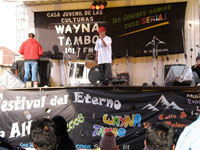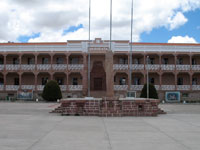Episode 11: Bolivia
Director: Felix Atencio-Gonzales
Bolivia’s Aymara youth are showing new pride in their culture by creating and singing songs in their own language. From the country’s first Aymara president, Evo Morles, to it’s first Aymara Chancellor, the voice of the Aymara people is being heard around the country.
Part 1

“Five years ago, many young people were ashamed of being Aymara or Quechua. I think music, theater and urban art are the tools that many are using to fight back.” - Abraham Bohorquez, musical group Ukamau y ke
In Bolivia, There are 33 different languages, with Aymara and Quechua being two of the largest groups. Although indigenous people make up the majority of the population, Spanish is often spoken in the cities. Many young Aymaras believe the Aymara language is old fashioned and their willingness to speak it often fades further when faced with discrimination or sarcasm in the cities.
In El Alto, Aymara youth organize a cultural show that includes dance, theatre, poetry and music. Organizers believe the event is important in helping to reconnect youth with their roots and language. The musical groups that perform at the event are part of a new trend. They are singing contemporary songs in their own Aymara language. Abraham Bohorquez, of hip hop group Ukamau y ke, is one such artist singing in his own language about Aymara pride and culture.
Part 2

Education was once only available in the Spanish language. Today, Aymara is one of the official languages of Bolivia and has been taught in schools since 1994. The Warista Institute is one organization that helped the Aymara language to survive. Built in 1931 by the Aymara people, without any government support, the Warista Institute allowed Aymaras the freedom to learn to read and write in their own language.
Bolivia is changing and the voice of the Aymara people is now being heard around the country and in the political forum. Bolivia elected its first Aymara president, Evo Morles, and also has its first Aymara Chancellor.
Part 3
“The problems is that teenagers are afraid to speak Aymara. I believe it’s the fear of discrimination. Even if they know how to speak Aymara, they hide it. This is a result of colonization.” - Rufino Machaca Mamani
Media and technology are helping to keep Aymaras connected to their language. Radio San Gabriel is a station that airs exclusively in the Aymara language. It has recently branched out and created educational television shows in the Aymara language.
Atamira is a translation program based on the structure of the Aymara language. It is so versatile that it allows the speakers of twelve different languages, include Aymara to communicate simultaneously in the chat forum, Qopuchawi.

